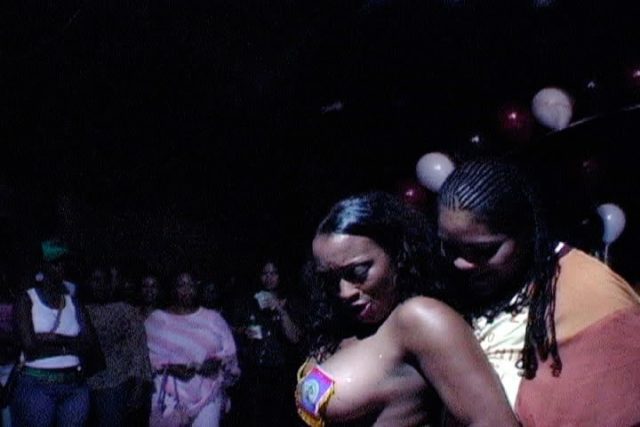
The erasure of queer women in media is extremely pertinent, and even more so the erasure of queer women in history. The vitality of visibility rests in the fact that visibility leads to normalization. These documentaries not only champions the lives of queer women, but they force audiences to reexamine the lens through which they are used to seeing us.
Game Girls
Game Girls is the second documentary feature by Polish filmmaker Alina Skrzeszewska. The film follows Teri and Tiahna, a Black lesbian couple that lives in Skid Row, a part of downtown LA that contains the largest stable homeless population in the country. We see them deal with a myriad of issues including mental illness and imprisonment. Nowhere in the film is context given about the magnitude of LA’s homeless population, no statistics about how disproportionately LGBTQ people are affected by homelessness. The focus is on these two individuals’ lives, which ultimately allows the film not to feel exploitative. Rather, it forces the audience to experience a reality they wouldn’t normally encounter. And it does so compassionately. This film is heartbreaking but required viewing to understand the range of queer women’s experiences that exist in LA alone.
Currently on a festival run and is set to be released to select streaming services on November 7th
The New Black
One of the side effects of intersectionality is conflicting identities. Yoruba Richen’s The New Black seeks to remedy her seemingly conflicting Blackness and queerness by exploring the Black community’s relationship with the LGBTQ civil rights movement. Richen dissects both the pushback against gay marriage and the refusal to equate racial liberation and sexual liberation. The film asks hard questions, some that it never fully answers, but ultimately it reminds both the subjects in the film and the audience that queer black people don’t experience those identities separately — they actively inform and modify each other.
Available to rent on YouTube, Amazon, and iTunes
Shakedown
Lesbian nightlife culture is an enigma to most and its existence has seldom been documented. For 15 years, from the late ’90s to early ’00s, Leilah Weinraub was a videographer for a lesbian club geared towards women of color in Los Angeles called The Shakedown that was steadily redefining queer nightlife. This year, she used the 400-plus hours of archival footage to to make Shakedown, her debut feature film about the representation of diverse lesbian visibility void of exploitative voyeurism. The film feels deeply authentic because it was made by someone who was part of the community; it’s an introspective look at the once-utopian existence of a space as opposed to an exposé by an outsider. It also ardently demonstrates an untraditional view of lesbian visibility, featuring mostly Black, Latinx, and plus-sized women expressing themselves uninhibitedly without societal restrictions. Both because and in spite of the fact the club no longer exists, the film is beautiful and moving.

Currently on a festival run, upcoming screenings available on shakedown.film
The Death and Life of Marsha P. Johnson
Trans women of color have always been at the forefront of the queer liberation, and none more so than Marsha P. Johnson. Although her death was ruled a suicide after her body was found in the Hudson River, all the people who knew her believed she was murdered for being such an outspoken activist. This film both eloquently traces the life she lived and vehemently questions the way her death was handled. Although it is a tragic story, it’s a vital reminder of how many of the rights the queer community now has are rooted in Marsha’s activism. It’s also a call to action that feels as urgent as ever to fight for and protect each other as a community.
Streaming on Netflix
Jewel’s Catch One
Running a successful business in the US is relatively hard. Running a successful gay club, in Los Angeles, as a gay Black women since the early ’70s? That’s practically impossible. The fact that Jewel Thais-Williams did that was unprecedented, and filmmaker C. Fitz recognizes that in Jewel’s Catch One. Catch One was considered the Studio 54 of the West Coast, and Thais-Williams’ relentlessness in keeping the club open to provide a safe, fun place for her community was no easy feat. She suffered every kind of discrimination and harassment possible from everyone including neighbors and the LAPD — but it all rolled right off her because she knew that what she was doing was important. C. Fitz perfectly captures Thais-Williams’ journey and impact in queer nightlife. My absolute favorite thing about this film is that it’s a success story, and that is so rare for queer women.
Streaming on Netflix
L Word Mississippi
There has always been this unfounded myth that gay people only exist in liberal coastal cities, as if our existence is a byproduct of privilege. As an African lesbian immigrant that grew up in Florida, I deeply resent that notion. The queer communities in Southern and rural parts of the country, small as they might be, exist and they’re strong. Not only do they have to experience the world as queer people, they have to constantly fight for a place in their own home. L Word Mississippi explores the lives of seven lesbians living in the Bible Belt and documents the unique bigotry they experience on a regular basis. These women, however, aren’t defined by their trauma, and the film optimistically limns the triumphs of their lives. It’s emotional and raw and a reminder that regardless of your circumstances, life is more than just survival.
Streaming on Showtime
Chavela
Chavela Vargas was unapologetically unconventional. The way she revolutionized ranchera music as a butch woman who blatantly desired women is delineated in the film to perfectly craft the tale of a woman who was clearly ahead of her time. The Costa Rican singer who spent so much of her life redefining a genre that inherently rejected her gender expression lived a life full of tumultuous highs and lows. Although demonstrating her importance to queer Latinx women isn’t the film’s explicit purpose (after all, Vargas did not officially come out as a lesbian until she was 81 years old), it does so effortlessly.
Available to rent on YouTube
Dykes, Camera, Action!
Lesbian representation in media is not the best. We’re always dying, ending up with men, or going on wild goose chases to find sperm donors. Dykes, Camera, Action! as film says that that isn’t necessarily true. It digs through the history of lesbians in cinema and provides evidence that we’ve always had the power to tell our own stories, good stories with real endings, however incessant the pushback from mainstream film culture. As a film lover, I have already seen the film six times and a seventh time as I am writing this. Filmmakers including Rose Troche, Angela Robinson, and Cheryl Dunye talk about the lesbian films that introduced them to sexuality that is void of male attention and how that influenced their own work. Nothing inspires me more as a lesbian filmmaker than being shown proof that we’ve done this before and we can do it again. It’s a very special kind of hope and optimism that I’m going to hoard, and hold on to every time another straight man decides he understands lesbians.
Currently on a festival run, upcoming screenings available on dykescameraaction.com
Tig
I have, on multiple occasions, stated that Tig Notaro is one of the funniest people in the world and I stand by that statement. But even if you’re unfamiliar with her comedy, this documentary is a testament to the power of comedy to heal. The film chronicles a three-month period in Notaro’s life during which she gets a bacterial infection, loses her mother, and gets diagnosed with breast cancer. Through that harrowing time, she makes a standup album that completely fast-tracks the trajectory of her career. It’s so sweet and genuine and it will leave you feeling so grateful for the mundanities of life.
Streaming on Netflix
The more our lives and our stories are relegated to “identity politics” and omitted from history books, the longer it’s going to take to demystify queerness. Showing the real complex and intersectional lives of queer women both today and in the past is how we remind people that we’ve always been here and we’re not going anywhere. Our existence deserves to be not just documented, but venerated.

What Do You Think?